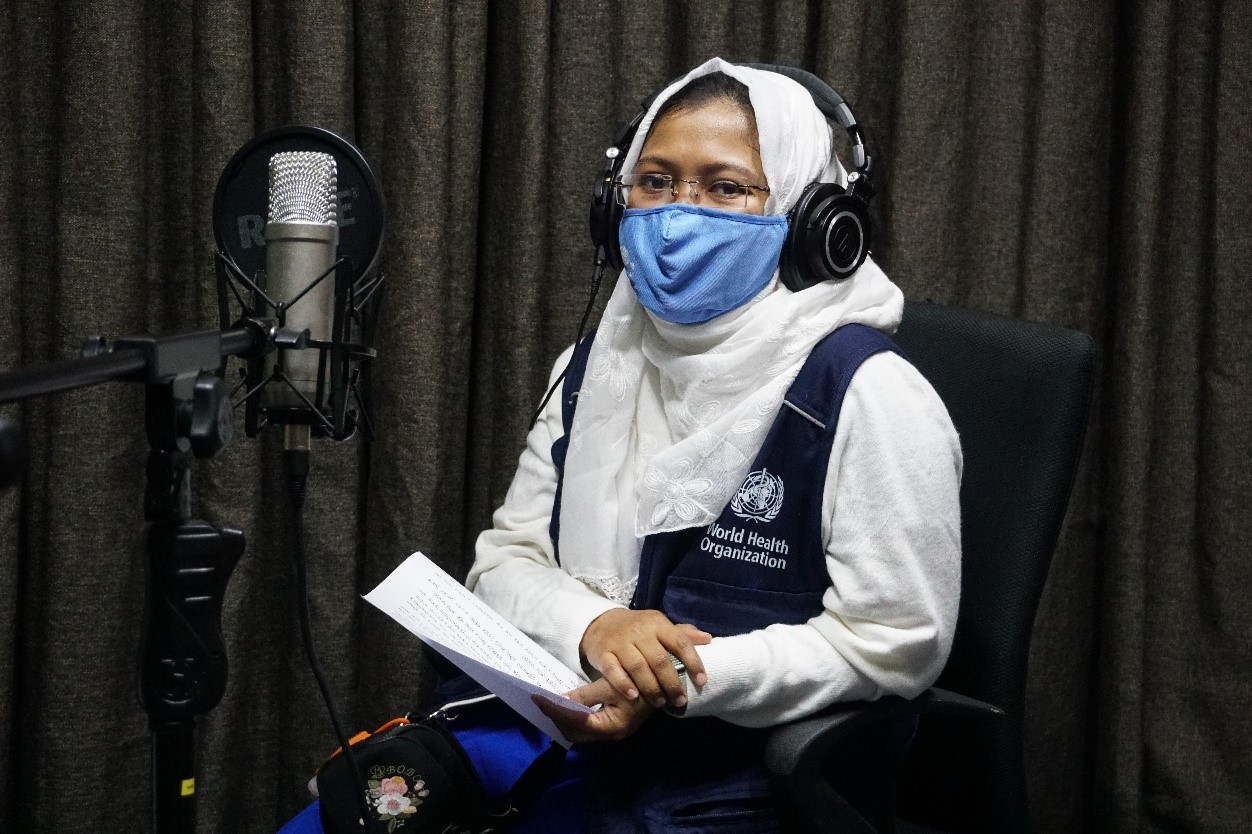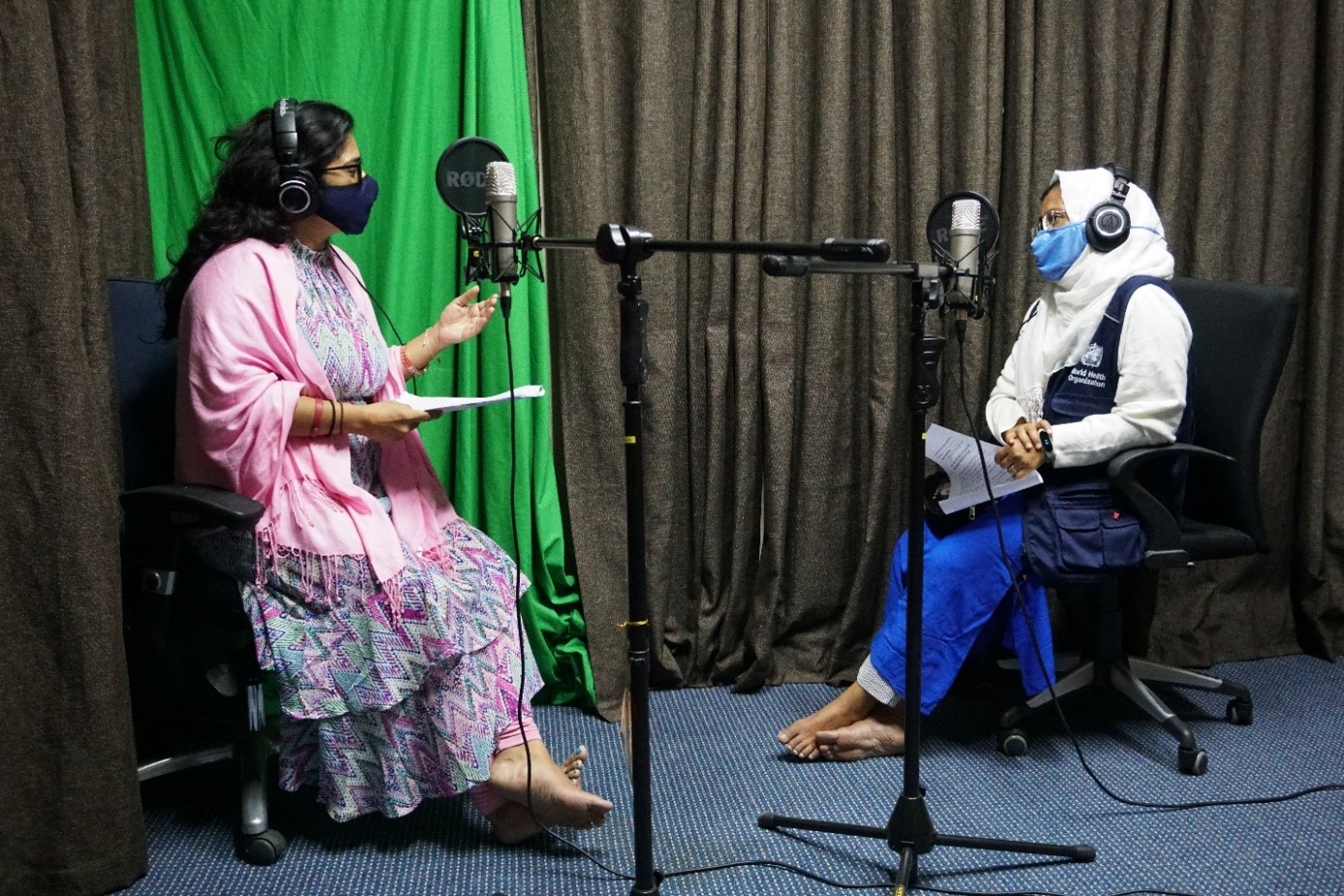When COVID-19 hit globally, in Bangladesh and in Cox’s Bazar, the Communications with Communities Working Group (CwC WG) and the ISCG activated a Risk Communication and Community Engagement Working Group (RCCE WG) to enable real-time exchange of information to prepare vulnerable groups for COVID-19 pandemic.
Together, CwC WG agencies, Translators Without Borders, BBC Media Action, UNICEF, UNHCR, WHO, and representatives from Health/Community Health Working Group and the WASH sector, implemented a community outreach strategy that included utilizing all channels available to wind up the COVID-19 infodemic, mitigate misinformation and rumors, and promote health and well-being.
Accessible anywhere at any time, in addition to capacity for perpetual adaptation to the rhythm of societal transformations and listeners, Cox’s Bazar community radios soon became key stakeholders in ensuring quick, timely community outreach to affected populations while providing correct information in the right language.
On World Radio Day, we pay tribute to radio’s capacity to exchange, innovate and connect people during these particularly challenging times.
 WHO National Technical Officer, Dr Umme Asma Absari was one of the first humanitarian responders deployed to Cox’s Bazar in 2017. In addition to her degree in medicine, her local language skills have been key to bring Rohingya refugees accessible health education throughout the entire humanitarian response. WHO Bangladesh/Tatiana Almeida
WHO National Technical Officer, Dr Umme Asma Absari was one of the first humanitarian responders deployed to Cox’s Bazar in 2017. In addition to her degree in medicine, her local language skills have been key to bring Rohingya refugees accessible health education throughout the entire humanitarian response. WHO Bangladesh/Tatiana Almeida
Present in many parts of the world, BBC Media Action is the BBC’s international charity focusing on informing, connecting and inspiring change among vulnerable populations. In Cox’s Bazar, the organization is helping encourage informed decision making and positive behavior change during the COVID-19 pandemic.
“BBC Media Action produces Soiyi Hota, a weekly audio podcast program that covers important issues, information and advice that the community is able to act on. Audio programs are a key way to get the information out and are a space where people can ask questions with answers provided by experts. These programs are played by local radio stations, at food distribution centres and mosques. The content is also shared amongst the community using WhatsApp and Bluetooth”, explains BBC Media Action Senior Project Manager, Kate Gunn.
“The first messages targeting the Rohingya refugees outlined COVID-19 symptoms and how to seek help for any concerning signs of the disease, preventive measures such as handwashing, physical distancing and other approaches to general hygiene, and soon it became clear that the Rohingya people would greatly benefit from language and culturally inclusive information”, says WHO National Technical Officer Dr Umme Asma Absari.
“Good morning Cox’s Bazar! This week’s Soiyi Hota [correct information, in Rohingya language] audio podcast brings back Dr Umme Asma Absari. Working for the World Health Organization, Dr Asma is here today to talk about the benefits of facility-based deliveries”, tells Tasnim Khandokar, BBC Media Action Assistant Producer to the microphone.
 BBC Media Action Assistant Producer, Tasnim Khandokar, interviewing WHO National Technical Officer, Dr Umme Asma Absari, for the weekly audio podcast Soiyi Hota. WHO Bangladesh/Tatiana Almeida
BBC Media Action Assistant Producer, Tasnim Khandokar, interviewing WHO National Technical Officer, Dr Umme Asma Absari, for the weekly audio podcast Soiyi Hota. WHO Bangladesh/Tatiana Almeida
Every week, WHO and UNICEF provide English and Bangla versions of a radio script on COVID-19 confirmed cases as well as the number of tests conducted among refugee and host communities to partners for wider dissemination through the Rohingya community.
“WHO works with UNHCR and the Community Health Working Group (CHWG) to effectively implement the strategy to strengthen community engagement, which was launched in June 2020, while supporting the 1500 Community Health Workers (CHWs) who conduct more than 140 000 household visits per week in the refugee camps”, tells WHO Public Health Officer, Dr Rajan Bikram Rayamajhi.
“Refugee Community Health Workers have been the backbone of the health response within the Rohingya refugee camps throughout the COVID-19 pandemic. With access to the camps restricted in an effort to reduce the further transmission of the virus, we have depended on refugees themselves to support one another, sharing important information door-to-door on COVID-19 prevention, referring people for testing and treatment, and combatting negative rumours”, shares UNHCR Senior Public Health Officer, Dr. Allen Gidraf Kahindo Maina.
-in-august-2018-following-a-diphtheria-outbreak.-_who-bangladesh-ta.jpg?Status=Master&sfvrsn=4b0a5219_7) A Rohingya refugee, 22-year-old Siraj became a Community Health Worker (CHW) in August 2018 following a Diphtheria outbreak. As a trusted member in the community, he is sharing key information on health promotion, referrals and communication from the Health Sector and RCCE WG while addressing fears, misinformation and rumours. WHO Bangladesh/Tatiana Almeida
A Rohingya refugee, 22-year-old Siraj became a Community Health Worker (CHW) in August 2018 following a Diphtheria outbreak. As a trusted member in the community, he is sharing key information on health promotion, referrals and communication from the Health Sector and RCCE WG while addressing fears, misinformation and rumours. WHO Bangladesh/Tatiana Almeida
-is-playing-an-audio-podcast-to-hoson-yaman-at-her-shelter-in-camp-5-.jpg?Status=Master&sfvrsn=570ca9df_7) A Community Health Worker in Ukhiya, Reyazu (on the right), is playing an audio podcast to Hoson Yaman at her shelter in Camp 5. The household visit is an opportunity to encourage the family to plan what to do in case someone has symptoms or becomes sick with COVID-19, including the nearest healthcare facility, how to transport COVID-19 suspected cases, isolation and quarantine. WHO Bangladesh/Tatiana Almeida
A Community Health Worker in Ukhiya, Reyazu (on the right), is playing an audio podcast to Hoson Yaman at her shelter in Camp 5. The household visit is an opportunity to encourage the family to plan what to do in case someone has symptoms or becomes sick with COVID-19, including the nearest healthcare facility, how to transport COVID-19 suspected cases, isolation and quarantine. WHO Bangladesh/Tatiana Almeida
“I became a community health worker in the beginning of the COVID-19 response because I felt that I could help in the fight against the virus. My role is to interact directly with my people and try to get the greatest benefit from what I have learned. The radio audios saved in my phone are helpful in that regard and usually children gather around us to listen to it as well”, says Reyazu.
While countering misinformation, the community engagement strategy in Cox’s Bazar helps maintaining the trust between humanitarian aid and communities during COVID-19 pandemic. At the same time, it allows people to take practical and pro-active steps for themselves and brings a sense of empowerment and ownership to both Rohingya and host communities during a frightening time.
